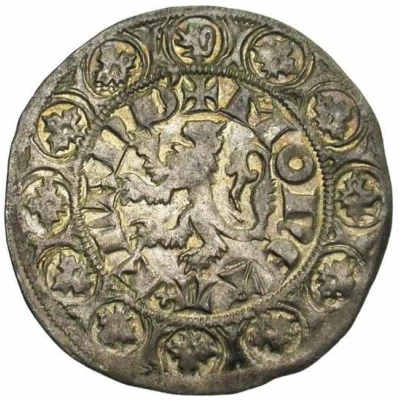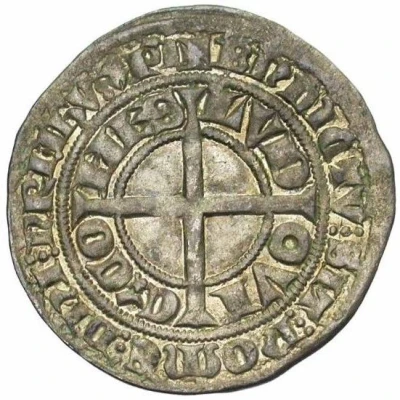


© Jean Elsen & ses Fils s.a.
1 Groat "Compagnon" - Louis II ND
| Silver (.500) | 3.3 g | 26.5 mm |
| Issuer | County of Flanders (Belgian States) |
|---|---|
| Count | Louis II of Male (1346-1384) |
| Type | Standard circulation coin |
| Years | 1346-1364 |
| Value | 1 Groschen (Groot) |
| Currency | Groot (864-1506) |
| Composition | Silver (.500) |
| Weight | 3.3 g |
| Diameter | 26.5 mm |
| Shape | Round (irregular) |
| Technique | Hammered |
| Orientation | Coin alignment ↑↓ |
| Demonetized | Yes |
| Updated | 2024-10-04 |
| Numista | N#94861 |
|---|---|
| Rarity index | 71% |
Reverse
Long cross divides inner legend.
Script: Latin
Lettering:
BnDICTV: SIT: nOME: DnI: nRI: IhV: XPI:
LUDOVIC' x COMES
Unabridged legend:
Benedictum sit Nomen Domini Nostri Jesus Christi
Ludovicus Comes
Translation:
Blessed be the name of our Lord Jesus Christ.
Count Louis.
Comment
Leeuwengroot or groot met de leeuw in Dutch.The lion groats of Louis I and Louis II can be differentiated by the punctuation of the legend obverse: eagle before MONETA on the groat of Louis I and the cross before MONETA for Louis II.
Between the 20th of january 1346 and the 28th of december 1373, 14.346.062 leeuwengroots were struck in Bruges, 3.295.225 in Mechelen and 48.915.766 in Ghent.
Literature: Gaillard 219-221 ; Haeck I-VIII
Variants:
A. Haecht has assigned variants to the known eight emissions of this type at the three Flemish mints, according to variations in these features:
- the parlsey leaves in the obverse border: thee lobes or five lobes
- the punctuation around the cross ✠ . None (diagnostic of Emission I), dot right of cross, dot on both sides of cross (diagnostic of Emission III), dot left of cross
- the shape of the letter O in COMES reverse: round (diagnostic of Emission II) or oval
- the presence of a dot at the tip of the Ls in FLAnD' and LVDOVIC' (diagnostic of Emissions VII/VIII)
- variations in the cloverleaf separating MOnETA and FLAnD
- shape of the letters A in MOnETA and FLAnd
Emission I , Ghent, January - November, 1346:
No dots around cross ✠ , parsley leaves with five lobes: